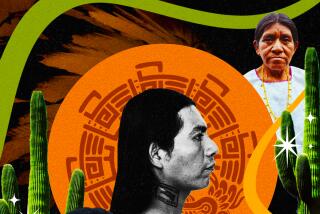Foundations work to save dying languages
- Share via
WASHINGTON — Every two weeks or so, the last elderly man or woman with full command of a particular language dies. At that rate, as many as 2,500 native tongues will disappear forever by 2100.
David W. Lightfoot is helping to spearhead a government initiative to preserve some of these dying languages, believing each is a window into the human mind that can benefit the world at large.
“If we are going to lose half the world’s languages, that endangers our capacity to understand the genetic basis of language,” said Lightfoot, who heads the directorate of social, behavioral and economic sciences at the National Science Foundation.
The foundation recently joined the National Endowment for the Humanities in the effort to preserve languages.
The project has awarded $4.4 million to 26 institutions and 13 individual scholars to investigate the status of 70 languages that are believed to be endangered and to help preserve them. The project is now asking researchers to apply for additional grants, with the expectation that at least $2 million a year will be available.
Some experts say there are up to 10,000 different languages left in the world; others put the estimate thousands lower depending on how many are characterized as dialects.
Languages aren’t just words, linguists say, but a people’s way of looking at the world.
Lightfoot gives the example of Guguyimadjir, spoken by people in the Australian state of Queensland. They have no words for “left” or “right” but orient themselves and their world by the points of the compass -- unlike most of us, who see things in relation to ourselves rather than to the world as a whole.
People in Brazil’s Amazon rain forest who speak Piratapuyo say “the cake ate John,” where English speakers would say “John ate the cake” -- in other words, they put the object of a verb first and the subject last.
Such peculiarities feed research on how the human mind works, how it perceives relations in space, how children learn complex languages so quickly and easily, Lightfoot said.
These types of research will be aided by one method of saving languages: by recording their speech, analyzing their grammar, and preserving them digitally.
More to Read
Sign up for Essential California
The most important California stories and recommendations in your inbox every morning.
You may occasionally receive promotional content from the Los Angeles Times.













